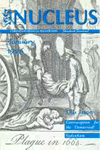The language used implies Uzzah's death was immediate, suggesting a cardiovascular cause. His youth (he was still living in his father's house) and fitness (he was chosen to perform a manual task), would make ruptured aneurysm, brain stem infarction and massive pulmonary embolism unlikely explanations. There is also no history of previous illness or injury, effectively precluding aortic stenosis, myocarditis, cardiomyopathy or pericardial tamponade associated with sudden pump failure or dysrhythmia.
Acute myocardial infarction with ventricular fibrillation is a possible option, but there are no associated symptoms, and again it is unusual in this age-group and cultural setting. This must bring us to consider rarer fatal rhythm abnormalities such as primary ventricular fibrillation, trifascicular AV block or hereditary QT prolongation.
The fact that Uzzah died while touching the ark has led some to suggest he may have been electrocuted; the gold plate and acacia wood sandwich functioning like a giant capacitor. However the ark dimensions listed (Ex 25:10-22) make this possibility rather remote.
While being open to God acting in natural ways, and being tempted by the young age and onset during exercise to plump for prolonged QT even in the absence of family history, Luke favours a supernatural aetiology. If we learn nothing else from the passage, we are certainly left in no doubt about the holiness of God.
Differential Diagnosis 16
To the consternation of the Pharisees, Jesus healed a blind man by putting mud on his eyes. From the information in the passage (Jn 9:1-41). What was the most likely cause of the lost sight? More importantly, what truth was Jesus demonstrating in performing the miracle?
Luke's opinion in next issue.
































